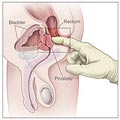Description of the test
A digital rectal exam (DRE) is a test that lets your doctor examine your rectum and the tissues near the rectum, as part of your routine physical examination or to assess certain symptoms. Your doctor can check for abnormalities in the walls of the rectum, including tenderness, swelling, and unusual lumps.
During the examination, your doctor may check your prostate gland if you are male or some of your reproductive organs if you are female. Your doctor may also take a stool sample for further testing to determine the presence of bleeding, which may be an indication of a problem with your digestive tract.
How often should the test be performed?
The frequency of this test is usually determined by your doctor. Because there is not enough evidence to show that DRE reduces deaths due to prostate cancer, the American Cancer Society and Canadian guidelines recommend that men thinking about prostate screening talk to their doctors about the risks and benefits of using DRE for screening.
It is a particularly good idea to discuss this with your doctor if you are a male 50 years of age or older. You may have a DRE even if you are younger than 50 years of age if you have a higher risk of developing prostate cancer (e.g., if you have a family history of prostate cancer or if you are of African descent).
Your doctor may recommend a DRE as part of a physical exam to check for problems other than prostate cancer.
Why is this test performed?
The test is performed to check for possible evidence of cancer, including prostate and colorectal cancer. A DRE can detect enlargement of the prostate, a condition known as benign prostatic hypertrophy (BPH). It may also be performed to check for blockages or to check for causes of rectal bleeding. In women, a DRE can be used to detect some gynecological problems.
Are there any risks and precautions?
You may feel a little discomfort during the examination. You may also experience a small amount of bleeding from your rectum, particularly if you have hemorrhoids or anal fissures.
Rarely, some people may feel light-headed or faint during the examination, especially if they are standing up.
What happens during the test?
At the beginning of the procedure, you will be asked to remove any clothing from the waist down. Men often have the examination while standing up and bending forward at the waist. They may also have the examination lying on their side with their knees bent towards their chest. Women can have the examination while lying on their back with their legs supported by stirrups.
At this point, your doctor will then insert a lubricated, gloved finger into the rectum through your anus. He or she will be feeling the lining of the rectum wall for abnormalities. Men will also have their prostate glands examined for size, hardness, and smoothness. Women may have some of their reproductive organs examined.
How should I prepare for this test?
No special preparation is needed for the procedure.
Tell your doctor if you have any hemorrhoids or anal fissures so that your doctor can try to avoid aggravating them during the procedure.
What can I expect after the test?
You should be able to leave your doctor's office without assistance.
Results
Your doctor will follow up with you in a timely manner regarding the results of your examination. If you experience anything unusual following your examination, which can include abdominal or rectal pain, or bleeding from the rectum, contact your doctor immediately.
All material copyright MediResource Inc. 1996 – 2024. Terms and conditions of use. The contents herein are for informational purposes only. Always seek the advice of your physician or other qualified health provider with any questions you may have regarding a medical condition. Source: www.medbroadcast.com/procedure/getprocedure/Digital-Rectal-Exam

The doctor inserts a lubricated, gloved finger into the rectum and feels the prostate to check for anything abnormal. (Image courtesy of www.cancer.gov)






